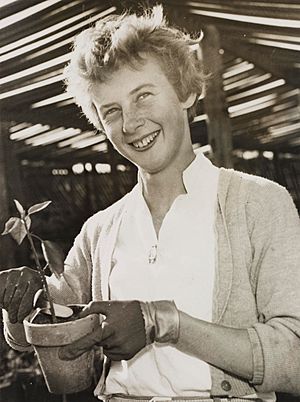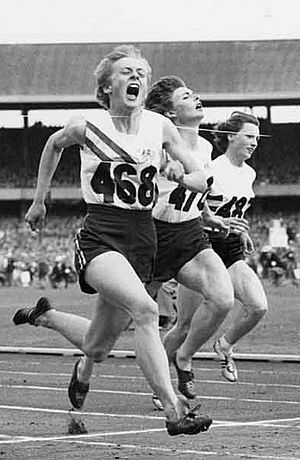Betty Cuthbert facts for kids

Betty Cuthbert c. 1950s
|
|||||||||||||||||||||||||||||||||||
| Personal information | |||||||||||||||||||||||||||||||||||
|---|---|---|---|---|---|---|---|---|---|---|---|---|---|---|---|---|---|---|---|---|---|---|---|---|---|---|---|---|---|---|---|---|---|---|---|
| Birth name | Elizabeth Alyse Cuthbert | ||||||||||||||||||||||||||||||||||
| Nationality | Australian | ||||||||||||||||||||||||||||||||||
| Born | 20 April 1938 Merrylands, New South Wales, Australia |
||||||||||||||||||||||||||||||||||
| Died | 6 August 2017 (aged 79) Mandurah, Western Australia, Australia |
||||||||||||||||||||||||||||||||||
| Height | 5 ft 6+1/2 in | ||||||||||||||||||||||||||||||||||
| Weight | 126 lb | ||||||||||||||||||||||||||||||||||
| Sport | |||||||||||||||||||||||||||||||||||
| Country | Australia | ||||||||||||||||||||||||||||||||||
| Sport | Athletics | ||||||||||||||||||||||||||||||||||
| Event(s) | 100 metres 200 metres 400 metres |
||||||||||||||||||||||||||||||||||
| Coached by | June Ferguson | ||||||||||||||||||||||||||||||||||
|
Medal record
|
|||||||||||||||||||||||||||||||||||
Elizabeth Alyse Cuthbert (born April 20, 1938 – died August 6, 2017) was an amazing Australian athlete. She became an Olympic champion four times! People often called her Australia's "Golden Girl."
During her career, Betty set many world records. These included records for races like 60 metres, 100 yards, 200 metres, 220 yards, and 440 yards. She also helped Australian relay teams win races. These included the 4 × 100 metres and 4 × 110 yards relays. Betty had a special way of running. She would lift her knees high and run with her mouth wide open.
In 1998, she was named an Australian National Treasure. She was also honored in the Sport Australia Hall of Fame in 1994. In 2000, she joined the Athletics Australia Hall of Fame.
Contents
Her Early Life
Betty Cuthbert was born in Merrylands, New South Wales. She grew up in Ermington, a suburb of Sydney. Her parents, Leslie and Marion, owned a plant nursery. Betty had a non-identical twin sister named Marie, also known as 'Midge'. She also had an older sister, Jean, and a brother, John. Betty was born 20 minutes before Marie.
Midge said that even though they were not alike, the twins were very special to each other. Betty remembered that her parents always supported her. She said she had a good home life. Her family taught her to respect things and other people.
Betty's mother took her and her siblings to Sunday school. As a teenager, Betty went to Parramatta Home Science School. She left school at age 16 to work in her family's nursery.
A Champion Athlete
Betty Cuthbert was a member of the Western Suburbs Athletic Club. When she was 18, the 1956 Summer Olympics were held in Melbourne. Betty set a new world record in the 200 metres race. This made her one of the top athletes expected to win a gold medal.
Betty first reached the finals of the 100 metres. She set an Olympic record of 11.4 seconds in her heat. This was also her personal best time. Another Australian world record holder, Shirley Strickland, was eliminated. Betty won the 100 metres final. After that, she was the favorite for the 200 metres title. She won that race too, becoming Australia's "Golden Girl."
Betty earned a third gold medal in the 4 × 100 metres relay. She ran the final part of the race. The Australian team won and set a new world record.
In 1958, Betty set world records for 100 and 220 yards. But at the Australian Championships, her rival Marlene Mathews beat her in both events. Later that year, at the 1958 British Empire and Commonwealth Games in Cardiff, Wales, Betty finished fourth in the 100 yards. She came second in the 220 yards, again behind Mathews.
Betty also set a world record for 440 yards. This record was broken in September 1959 by Maria Itkina from the Soviet Union.
Before the 1960 Summer Olympics in Rome, Betty set a new world record. She ran the 220 yards and 200 metres in 23.2 seconds. She achieved this while winning the Australian championships. But at the Rome Games, she got injured. She was eliminated from the 100 metres quarterfinals. After this, she decided to retire from track and field.
Her retirement did not last long. She returned for the 1962 British Empire and Commonwealth Games in Perth, Western Australia. There, she helped Australia win a gold medal in the sprint relay.
After that, Betty focused on the 400 metres race. This event was added for women at the 1964 Summer Olympics in Tokyo. Even though she didn't seem to perform well in the early races, Betty won the 400 metres title. This was her fourth Olympic gold medal! She beat Ann Packer from Great Britain. Betty set an Olympic record of 52.01 seconds.
Betty Cuthbert is the only Olympian to have won a gold medal in all sprint events. These are the 100, 200, and 400 metres races. After the Tokyo Olympics, she retired from athletics for good. In 1964, she also received the Helms Award for her contributions to sports.
Her physical education teacher from high school, June Ferguson, was her coach.
Life Beyond the Track
Since 1969, Betty suffered from multiple sclerosis (MS). This is a long-term illness that affects the brain and spinal cord. In 2002, she had a serious health issue called a brain haemorrhage. Despite her MS, Betty said she never asked God "Why me?". Instead, she felt God wanted her to use her experience to help others.
In 1985, Betty became a born again Christian. She had always believed she was a Christian. But at a public event, a speaker talked about people who privately believed. Betty felt she needed to publicly share her faith in Jesus. From then on, she tried to share her faith with many people. She initially hoped to be healed of her MS. But she realized she was looking for healing, not the Healer. She said, "I found out about the healer, and then I couldn't care less about the healing. That's the best thing." She felt great joy and wanted to tell others. She thought this was why she returned to the Olympics in 1964. Being well-known helped her share her message.
After being diagnosed with multiple sclerosis, Betty became a strong supporter for people with the illness. She played a big part in creating MS Research Australia. She attended its opening in 2004 with the Prime Minister, John Howard. She worked tirelessly to raise awareness about MS across Australia. After she passed away in 2017, the CEO of MS Research Australia, Dr. Matthew Miles, said Betty had a huge impact. She helped Australia understand and recognize MS much better.
In 1991, Betty moved from New South Wales to Mandurah, Western Australia. She was one of the people who carried the Olympic Torch at the opening ceremony of the 2000 Summer Olympics in Sydney. Sitting in a wheelchair, and with Raelene Boyle by her side, she carried the torch. She was one of the final runners before Cathy Freeman lit the Olympic Flame.
Betty Cuthbert passed away in 2017 at the age of 79 in Mandurah. She never married or had children. Rhonda Gillam, a 78-year-old woman, cared for Betty for 26 years. Rhonda said that Betty's MS also affected her hearing. Betty's twin sister, Midge Johnston, said Betty had some memory challenges in her later years. Midge worried Betty wouldn't remember her. But Betty always said, "Midge, of course I remember you."
Remembering a Legend
The day after Betty's death, there was a moment of silence at the 2017 World Athletics Championships in London. Australian athletes were allowed to wear black armbands during their competitions. Betty Cuthbert was the only Australian among the first 10 people to be honored in the IAAF Hall of Fame in 2012. Many important Australians shared tributes about Betty's life and career:
- Cathy Freeman: Betty is an inspiration. Her story will keep inspiring Australian athletes for many years. I'm so happy I met such a wonderful role model and Olympic champion.
- Marlene Matthews: I have never met anyone with such strong faith and determination. This faith kept her going through very difficult times.
- John Coates: Betty fought her illness for many years and showed great courage. But most importantly, she always managed to smile. Betty was one of those special athletes who inspired thousands of Australians.
- Malcolm Turnbull: Rest in Peace Betty Cuthbert – an inspiration and a champion on and off the track.
- Bill Shorten: Rest in peace Betty Cuthbert, forever a golden girl.
Betty Cuthbert's funeral was held on August 16, 2017, in Mandurah. Her body was cremated. Many people attended, including Margaret Court, Raelene Boyle, and Marjorie Jackson. Dawn Fraser gave a speech. Her twin sister, Midge, lit a candle to remember her. Her niece and nephew, Louise and Peter, also spoke. A public memorial service for Betty was held on August 21, 2017, at the Sydney Cricket Ground. Tributes were led by broadcaster Alan Jones and Deputy Prime Minister Barnaby Joyce. Other former athletes, Norma Fleming and Marlene Matthews, were also there.
Honours and Achievements
Betty Cuthbert received many awards and honors throughout her life:
- In 1956, she won the ABC Sports Award of the Year.
- She was the captain of the women's team for the Rome Olympic team in 1960.
- In 1965, she was made a Member of the Order of the British Empire (MBE) for her services to athletics.
- She was the first female Trustee of the Sydney Cricket and Sports Ground Trust from 1978 to 1980.
- In 1983, she received the Olympic Order (Silver).
- She was made a Member of the Order of Australia (AM) in 1984 for her contributions to sport and the community.
- In 1985, she was one of the first people inducted into the Sport Australia Hall of Fame.
- A RiverCat ferry in New South Wales was named after her in 1992.
- She was named a National Living Treasure in 1998.
- In 2000, she was one of the first people inducted into the Athletics Australia Hall of Fame.
- A statue of Betty Cuthbert was unveiled outside the Melbourne Cricket Ground in 2003.
- In 2010, a rose was named after her.
- She was one of the first people inducted into the IAAF Hall of Fame in 2012.
- In 2018, a bronze sculpture of Betty Cuthbert was unveiled at the Sydney Cricket Ground. This made her one of the first female athletes to have a sculpture there.
- The main street of Ermington shopping centre is named Betty Cuthbert Avenue in her honor.
- The Betty Cuthbert Grandstand is at the Sydney Olympic Park Athletic Centre.
- At the time of her death, she was the youngest ever 200m gold medallist in Olympic history.
- She was the first Australian Olympian to win three gold medals at one Games.
- Betty Cuthbert is the only athlete to win gold medals in the 100m, 200m, and 400m at the Olympic Games.
Images for kids
See also
 In Spanish: Betty Cuthbert para niños
In Spanish: Betty Cuthbert para niños
 | Isaac Myers |
 | D. Hamilton Jackson |
 | A. Philip Randolph |



